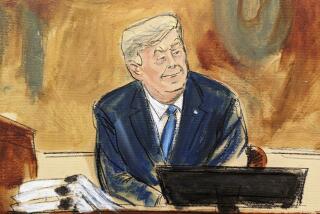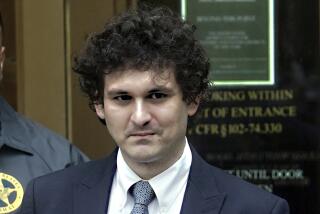Andersen Trial Yields Evidence in Enron Case
- Share via
Testimony detailing how Enron Corp. bullied its outside auditors into signing off on dubious transactions could play a key role in expected prosecutions of former Enron executives, legal experts say.
Testimony from Arthur Andersen accountants at the accounting firm’s six-week trial provided new details about how Enron aggressively pushed the firm to see things its way, even if it meant ignoring potentially massive accounting errors and violating Andersen’s procedures.
The testimony of Andersen accountants “sets the stage for portraying Enron as a very aggressive corporation whose credo seemed to be to press the outer edges of what was considered acceptable accounting practices,” said Robert Mintz, a former federal prosecutor who specializes in white-collar crime cases.
Andersen was convicted June 15 of obstruction of justice in connection with its audit of Enron. During the trial, prosecutors argued that Andersen’s lax treatment of Enron resulted in potential legal liability and provided the accounting firm with a motive to dispose of potentially incriminating documents and impede a Securities and Exchange Commission inquiry.
Justice Department investigators now are concentrating on Enron and its use of off-the-books partnerships that prevented investors from getting a true picture of the company’s financial condition.
Enron officials are expected to say they relied on Andersen’s advice to keep them in compliance with accounting standards.
But the Andersen accountants’ testimony in Houston could blunt that defense. Prosecutors can point to the accountants’ testimony to show that Enron took a push-the-envelope approach to its books and knew that Andersen’s approval came under pressure.
For example, Patricia Grutzmacher, an accountant on Andersen’s Houston-based team of Enron auditors, testified that a top Enron executive had tried to have her and another mid-level accountant removed from audits of Enron’s capital-management division because she wouldn’t sign off on Enron’s proposed accounting treatment on certain transactions.
“I feel like, if you didn’t act a certain way sometimes ... it could jeopardize your existence on the Enron engagement,” she testified.
Grutzmacher and another mid-level accountant, Jennifer Stevenson, testified that they discovered serious potential flaws in the handling of one of Enron’s off-the-books partnerships called Merlin. Grutzmacher said Enron reimbursed investors who lost money in the partnership even though the value of Merlin’s underlying assets had plummeted.
She said she was told the decision to reimburse the investors--which included another entity controlled by then-Chief Financial Officer Andrew S. Fastow--was made by senior Enron executives. She said the executives told Andersen they decided to pay the investors to avert lawsuits.
But the reimbursement would indicate that Merlin investors had no real money at stake, meaning that they did not qualify as independent outside stakeholders. Under accounting rules, that meant Merlin could not be treated separately and that its losses must be consolidated with Enron’s finances.
Grutzmacher said she objected to Enron’s treatment of the entity but was overruled by senior partners on the audit team, including David B. Duncan, the lead auditor who pleaded guilty in April to a separate charge of obstruction.
Prosecutors described Duncan as a “client advocate” and suggested that he sided with Enron against his firm’s technical accounting experts to keep Enron as a customer.
For example, testimony showed that in the fall of 2000, Enron proposed a method to help it conceal hundreds of millions of dollars in losses by four off-balance-sheet entities known as Raptors. Duncan proposed letting Enron account for the four Raptors’ financial results together, allowing profits from two stronger Raptors to cover losses from the weaker ones.
Ben Neuhausen, a member of the technical accounting unit, said experts in his division concluded that the technique didn’t comply with standards requiring such entities to report separately. Duncan’s team ignored the advice and allowed Enron to hide the losses with another dubious method without informing the experts.
But the technical team didn’t learn that its advice had been ignored until months later, after the Raptor losses had mounted and Enron decided to unwind the partnerships. The expert group saw, for the first time, memos in which Duncan mischaracterized their advice, saying the technical team had agreed with Enron’s view.
Carl Bass, another member of the technical team, told jurors he advised that an Enron plan to book profit from a defunct partnership with video-rental chain Blockbuster Inc. appeared ill-advised. The deal, in which Blockbuster would provide movies to be transmitted through Enron’s fiber-optic network, never got off the ground, and Bass suggested the operation was too small to count as a real business. But Andersen--despite Bass’ objection--let Enron record a $110.9-million gain from selling a piece of its share in the venture.
A short time later, Andersen--at Enron’s request--removed Bass from reviewing Enron’s finances. Enron believed Bass had raised too many questions about the transactions, Andersen executives testified.
John Stewart, the senior accountant on the specialist team, testified that Enron’s request struck him as “unprofessional” and that he was “upset” with his employer for caving in to the demand.
“We should have told them ‘no,’ and been more independent,” Stewart said.
More to Read
Inside the business of entertainment
The Wide Shot brings you news, analysis and insights on everything from streaming wars to production — and what it all means for the future.
You may occasionally receive promotional content from the Los Angeles Times.










